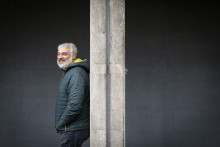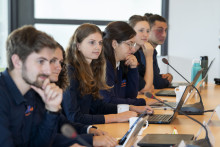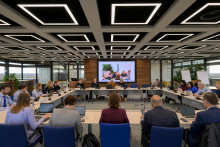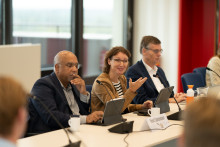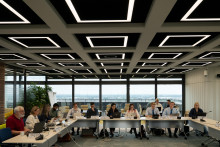To start out with the main question: what’s the importance of participation?
‘At the end of the day, everything is about transparent decision-making. Look, every year around 350 million euros of government money passes through this university. Transparent decision-making means engaging in a debate and asking: why are you spending that money in a certain way? This debate must be held at both the central and decentral level. A decision, regardless of the level at which it is made, must be understandable, traceable and in the best interest of the university.’
special Participation
On behalf of the UT participation, U-Today produced a magazine full of stories about students and employees who think and decide on policy at the University of Twente. The entire magazine can be read digitally here.
You’ve chaired UT’s University Council for many years. What do you think is the best way to go about participation?
‘In a sense, participation is co-deciding. You can go about it in different ways. As the council, you can tell the Executive Board: give us your decision and we’ll lock ourselves in a room and have our say about it. That’s bound to end badly. I’ve come to learn that it’s better to talk to each other and exchange views at an early stage. That makes for the best possible decision-making.’
They say you can’t polish a gem without friction. Aren’t clashes healthy from time to time?
‘Clashing now and then can be healthy, but clashing all the time can get counterproductive. For example, when we had that difficult debate on the budget last December, we could have sent the Executive Board a very sharply worded decision: either you agree to our demands or we won’t approve the budget. We made a conscious choice not to do that, but we did say: this is the situation we want to end up in. Without pushing the debate too far, we managed to steer things in our direction. You can of course say no to a plan, but then you have to be able to justify this at all times. Otherwise the relationship of trust will be negatively affected. And trust is the most important thing of all.
As a participation body, you can have numerous powers, but does that mean you have influence? Having influence is predicated on trusting each other, trusting that the right information will be shared in time. I’ve been known to say that good participation begets good governance. And good governance deserves good participation. You have to feed off each other.’
In what way?
‘I remember that a little under ten years ago, we received a document that related to a faculty. Parallel to that, that same faculty received a document with a different content. As you’ll understand, this caused tension. We had an informal talk with the Executive Board, resulting in our earlier and more explicit involvement in decision-making. I think the Executive Board deserves praise for taking this step. In the end, trust is also about breaking a negative spiral should you get caught in one.’
'I think that at the very least everyone should know how a council member feels about something'
Did you manage this?
‘Things have functioned better since then. A good example of this is the founding of the prestigious Max Planck Center at UT in 2017. We were involved in the decision and the rationale at an early stage, which meant the final debate went very quickly.’
Isn’t there a danger of doing too much behind closed doors?
‘That involves finding a balance in allocating importance to full transparency and good decision-making. You can’t see those two things as separate entities. As the chair, my main job is to ensure sufficient debate has taken place before a decision is made. I think that at the very least everyone should know how a council member feels about something. You’ve been elected to represent the people, so those people have a right to know whether you’re voting in favour or against something.’
So what’s the state of the Drienerlo democracy? Can it be improved when it comes to representation?
‘Things are good, but could be better. Our participation here in Twente is unique in that we have both student and employee representatives discussing things at the same table where everyone listens carefully to each other. And everyone at UT can vote and run in elections. But we’re not politicians in the true sense of the word. Just like the Executive Board, we consider the interests of UT. Compared to other universities, we have a fairly high electoral turnout, which reinforces the feeling that we’re representing the people. What’s more, we try to have the council be as diverse a reflection of the UT community as possible, so we can identify sentiments and problems and put them on the agenda. Yes, that’s definitely going well, but there’s always room for improvement.’


